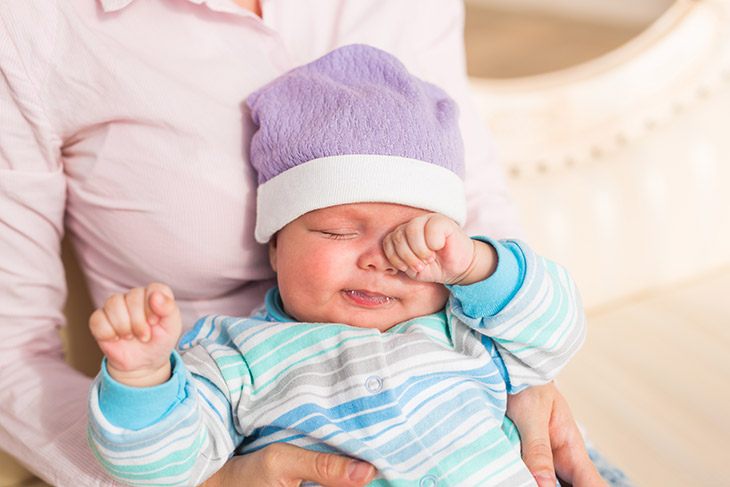How To Get An Overtired Baby To Sleep?
One of the most frustrating situations that parents may face is figuring out how to get an overtired baby to sleep. Exhausted or overtired babies fuss and cry, preventing them from relaxing their bodies. When an overtired baby finally goes to sleep, she is likely to wake up sooner than normal, finding it even harder to sleep again. This may make you feel confused as to what exactly you should do to help your little one relax and fall back to sleep.
More...
There is a huge difference between tired and overtired. When your baby is tired, her body will be ready to sleep according to her bedtime schedule. However, overtiredness is a condition that parents fear. This state of physical fatigue triggers the body’s stress-response system. For adults, some symptoms include irritability, lethargy, confusion, and cravings for carbs and sweets as the body needs quick solutions to regain lost energy.
For infants, the symptoms of overtiredness manifest in many ways and usually aggravate the problem. It is important for parents to completely understand this issue and know its symptoms to prevent your baby from being overtired.
How Do Babies Become Overtired?

Infants become overtired once their bodies are past the point of being ready for bedtime. They become physically fatigued that their stress-response system becomes activated. When your baby is in this state, stress hormones such as adrenaline and cortisol enter her bloodstream, making it difficult for her to calm down and sleep.
Understanding how hormones affect sleep can help parents get their babies to sleep on time. The key hormones that control sleep are cortisol and melatonin. The level of melatonin increases in the absence of light, helping our body to relax and fall asleep. On the other hand, cortisol keeps us alert and awake. The level is at its peak around 8 am, gradually decreasing through the day.
You can help your baby increase her melatonin hormones by closing the curtains during daylight to reduce brightness. Also, avoid trying to make her fall asleep when the levels of her cortisol are high.
Why Babies Become Overtired Easily?
One of the common causes of overtiredness is lack of sleep. As your child learns several things, she will need to take naps so she can process all information. This is the reason why babies have short “awake times” that increase with age. For example:
As your little one gets closer to completing her simulation or awake time, her body will be ready to take a nap. This is the right time to help her relax and fall asleep – the melatonin will overrule the levels of cortisol.
When she is not put to sleep at the right time, her body will start producing more of adrenaline and cortisol hormones. These hormones that keep the body awake will start flooding into her bloodstream and will make it hard for her to sleep, giving parents stress and constant worry.
Recognizing The Early Signs Of Tiredness

Knowing your baby’s signals can help prevent overtiredness. Here are some of the early signs of tiredness in infants.
If these signs of an overtired baby are missed, your crying and fussing baby will find it difficult to relax and sleep. A tired baby may arch her back and pull up legs, while an older baby may fight sleep, cry, reject the food, and scream. These behaviors are the usual response to stress hormones.
How To Get An Overtired Baby To Sleep?

Getting an overtired baby to relax and to sleep can be tough. You can try other tricks, such as soothe her to sleep and play music to help her relax.
Soothing Techniques
Here are some soothing techniques to help your little one fall asleep easily.
1. Feed your baby. A short bedtime feeding may help in calming your little one to sleep. Try to breast feed your baby and see if this will help. Avoid feeding her all the way to sleep as this may cause your little one to link feeding with sleeping.
2. Give a warm bath. You can try to give your baby a warm bath and put on a fresh diaper to help her body relax.
3. Rock your baby. Rocking your baby is one of the best ways to help her sleep. You can do this in a sitting or standing position. Place her on her bed before she is calm and drowsy.
4. Soothing massage. You can help your overtired baby relax with a soothing massage. Mix one tablespoon of baby oil with a drop of lavender oil and rub this mixture on your baby’s shoulders and back in gentle circular strokes.
5. Sing. Singing or humming a lullaby can help your little one fall asleep. You may also try shushing or talking to your little in a soft, low voice.
6. Implement a bedtime routine. Follow bedtime routine to help your baby recognize the signs and prepare for bedtime. For older babies, you may try reading books in the dim room.
Create A Pleasant Environment
Many parents keep the temperature too warm, which makes it difficult for babies to sleep comfortably. Here are some ways on how to create a pleasant environment for your little one.
1. Turn lights off or reduces brightness. Dim lights help babies calm down and settle for sleep. Try turning off all lights and leave a night light to let your child know that it is time for bed.
2. Play soothing music. Fussy babies can find relaxation through soothing music and white noise. You can also try nature sounds and classical music to help your little one unwind for bedtime.
3. Swaddle your baby. This technique may help an overtired baby relax and fall asleep. It is a process of wrapping your baby in a soft, lightweight blanket, so she is secure and cozy.
4. Adjust the temperature. The ideal sleeping temperature is 18.3 Celsius or 65 Fahrenheit. If you are using a thermostat, adjust the temperature to create a pleasant environment for your baby, making it easier for her to fall asleep.
Knowing these simple methods can help you get an overtired baby to sleep. Moreover, it is best to prevent your little one from becoming overtired.
How To Prevent Overtiredness?
Babies need to take regular naps as they get tired easily. Create a regular napping schedule and follow your plan to meet your baby’s sleep needs.
You can prevent your baby from being overtired by knowing what signs to watch for. Some common cues that your little one is ready to sleep include:
When you notice that your little one is drowsy, settle her down for a relaxing sleep.
Conclusion
Overtiredness can be difficult to deal with. Preventing it from occurring may feel like an impossible chore. Basically, you can ward it off by watching your little one’s sleep and feeding schedule. Make sure that her feedings and naps are happening at correct times to prevent your baby from staying awake for too long.
Try simple soothing techniques like rocking your baby, singing lullabies, humming, swaddling, and dimming the lights. If your baby becomes overtired often, it may be best to consult her pediatrician. Certain treatments might be required to get an overtired baby to sleep.
Recommended Articles:


